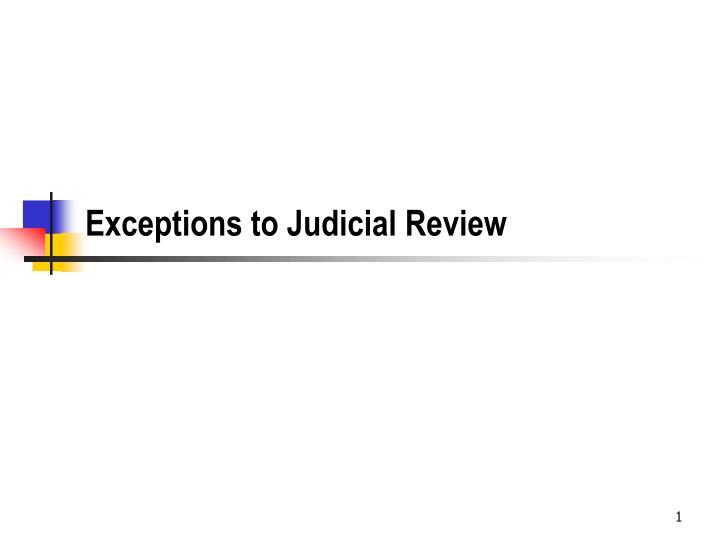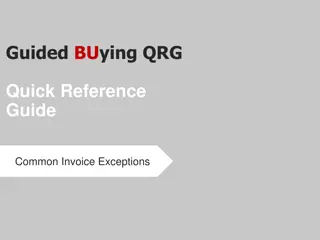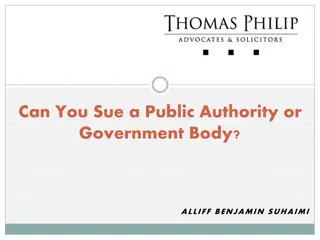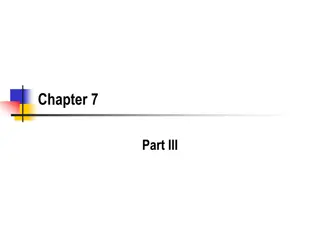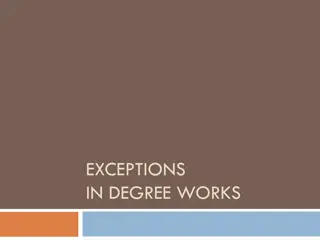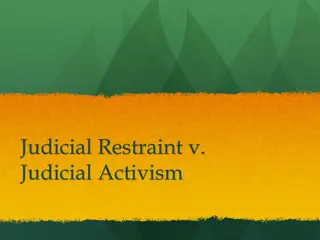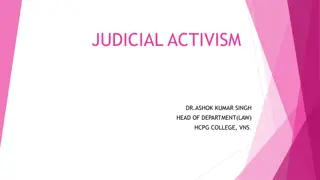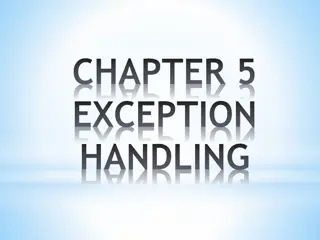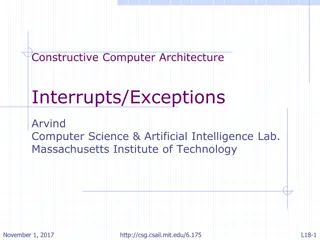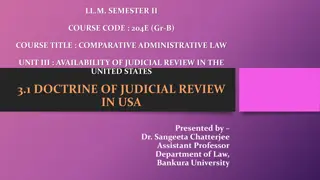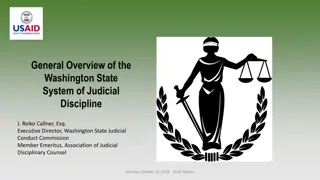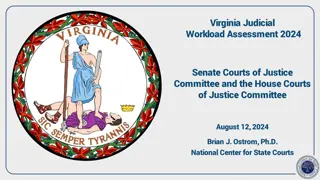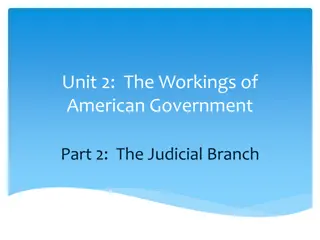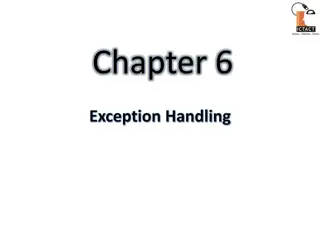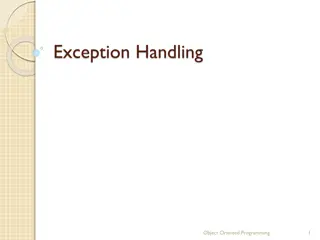Exceptions to Judicial Review
The statutory preclusion of judicial review and the impact of congressional actions on limiting judicial oversight. Dive into cases such as Abbott Laboratories v. Gardner and Block v. Community Nutrition Institute to understand the nuances of judicial review in administrative law.
Download Presentation

Please find below an Image/Link to download the presentation.
The content on the website is provided AS IS for your information and personal use only. It may not be sold, licensed, or shared on other websites without obtaining consent from the author.If you encounter any issues during the download, it is possible that the publisher has removed the file from their server.
You are allowed to download the files provided on this website for personal or commercial use, subject to the condition that they are used lawfully. All files are the property of their respective owners.
The content on the website is provided AS IS for your information and personal use only. It may not be sold, licensed, or shared on other websites without obtaining consent from the author.
E N D
Presentation Transcript
Statutory Preclusion of Judicial Review Congress has the power to limit judicial review of agency actions Subject to constitutional limits remember the procedural due process cases How specifically must congress speak? What if Congress is silent on the availability of judicial review in a particular statute? Does "Committed to agency discretion" mean that the action is not subject to judicial review? 2
Complete Preclusion of Judicial Review (2) JUDICIAL AND ADMINISTRATIVE REVIEW- No court of the United States, or of any State, District, territory or possession thereof, shall have subject matter jurisdiction to review, whether by mandamus or otherwise, any action by the Secretary under this section. No officer or employee of the United States shall review any action by the Secretary under this section (unless the President specifically directs otherwise) Smallpox Emergency Personnel Protection Act 2003 (Not in the book) 3
Is there Judicial Review at All Without Specific Congressional Authorization? Abbott Labs is an early foundational case in administrative law. We discuss Abbott Labs for two issues. At this point, the question is whether there is any judicial review at all, in the absence of specific congressional authorization. Later we will look at Abbott Labs in the context of the timing of review, i.e., was the issue ripe? 4
Abbott Laboratories v. Gardner, 387 U.S. 136 (1967) - Is There Review at All? This was a dispute over the authority of the FDA to require the generic name on prescription drug labels The plaintiffs claimed that the FDA exceeded its statutory authority FDA said that this was not reviewable because the enabling act provided for specific review of other actions and this was not included in the list The Court found that judicial review is favored, and that it would not hold it precluded unless the congressional intent was clear. 5
Block v. Community Nutrition Institute, 467 U.S. 340 (1984) Clarified Abbott's policy on reviewability Consumers wanted to challenge rules under the milk price support law, which was intended to protect milk producers The court found that Congress had specified who could appeal these orders and how. Coupled with the purpose of the act, this was enough to show intent to prevent consumer claims This might also be seen as a zone of interest question. 6
Does Committed To Agency Discretion By Law Mean No Judicial Review? 5 U.S.C. 701(a)(2) ( 701, et seq is judicial review) (a) This chapter applies, according to the provisions thereof, except to the extent that - (2) agency action is committed to agency discretion by law. This is related to the political question doctrine The courts recognize that agencies are charged with making policy under the direction of the legislature and the executive branches The proper review of a policy choice is through the ballot box This leads to Overton Park 7
Citizens to Preserve Overton Park v. Volpe, 401 U.S. 402 (1971) Congress said no federal money to build roads in parks if there was a "feasible and prudent" alternative The Secretary authorizes a road in a park and tells plaintiffs that it is within his discretion and cannot be reviewed by the courts Does the Court have a standard to review this decision, or is it a pure policy choice? The court found that "feasible and prudent" provided adequate law to guide judicial review Committed to agency discretion was held to be very narrow, unless specified by statute The agency has to build a record to support its decision before it gets deference. 8
Heckler v. Chaney, 470 U.S. 821 (1985) - Lethal Injection Case Death row inmates petition the FDA to prevent the use of FDA licensed drugs for executions, arguing that it is not an approved use. FDA refuses, and the inmates sue. The court rejected the challenge, finding this is allowable prosecutorial discretion, which an agency does not have to justify. Later cases establish that the FDA does not have the authority to regulate post-sale use. 9
Decisions on Rulemaking Petitions The court held that a decision to refuse to amend a rule was different from prosecutorial discretion to do enforcement, allowing judicial review of these petitions for rulemaking. This review is implicit in the statutory provision for rulemaking petitions. American Horse Protection Assn., Inc. v. Lyng, 812 F.2d 1 (D.C. Cir. 1987) 10
Webster v. Doe, 486 U.S. 592 (1988) National Security Act allows CIA employees to be fired without due process or judicial review Court says this is within congressional power, especially for national security Court says that the plaintiff's constitutional law claim can be reviewed because no agency is above the constitution. Like stigma plus, with the stigma being a constitutional violation such as firing based on race. Dissent says this makes no sense because it undermines the agency discretion. Lower courts limit discovery to protect the agency. 12
